O
Published online by Cambridge University Press: 10 November 2010
Summary
O. A circle, formerly the sign of Tempus perfectum, as the incomplete circle ⊂ was of Tempus imperfectum. [See Tempus, Modus and Prolatio.]
O (It.) Or, as flauto o violine, flute or violin.
Oaten-pipe. The simplest form of a reed pipe, a straw with a strip cut to form the reed, at the end closed by the knot.
Ob. Abb: of Oboe, also of obbligato.
Obbligato. An instrumental part or accompaniment of such importance that it cannot be dispensed with.
Ober (Ger.) Over or upper, as, Obermanual, or Oberwerk, the upper manual; Oberstimme, and Obertheil, upper part.
Obligé (Fr.) [Obbligato.]
Oblique motion. When one part moves and the other remains stationary. [Motion.]
Oboe. One of the most ancient, as also one of the most charming instruments of music. In some of the Egyptian pipes in the British Museum were found pieces of thin wood or straw inserted into the tubes in such a manner as to suggest at once the similarity between them and the oboe. In all probability the Greeks used instruments of this class, although they called them by the general name of “flute.” That the reeds used were very small, and of more perishable material than the tubes into which they were inserted, is quite sufficient to account for the fact that we have not discovered a pipe with a reed fixed in it ready for use, among Greek antiquities. Moreover, it must be remembered that musicians do and always did carry their reeds and mouthpieces about, separated from the instrument.
- Type
- Chapter
- Information
- A Dictionary of Musical Terms , pp. 317 - 341Publisher: Cambridge University PressPrint publication year: 2009First published in: 1876



